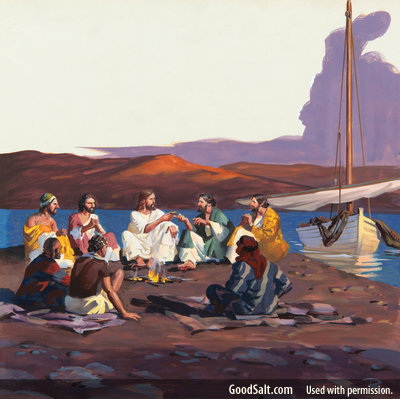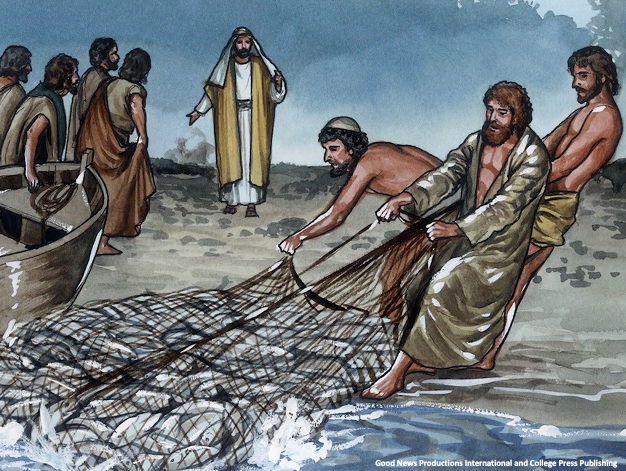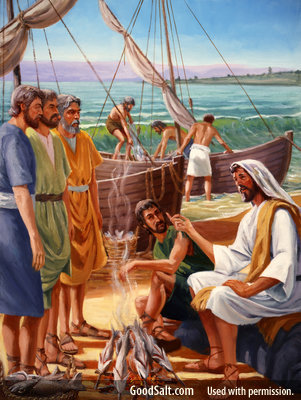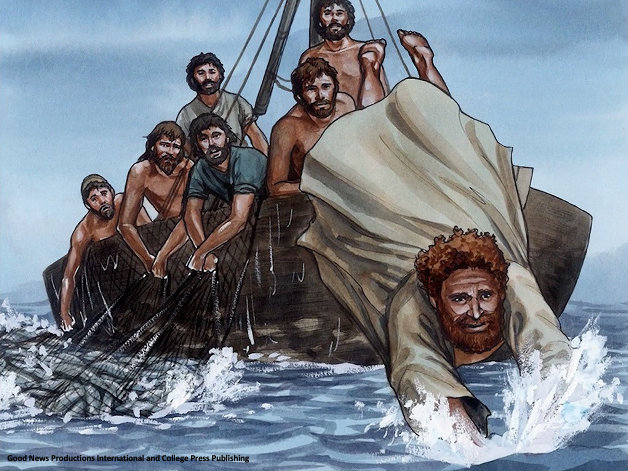“Jesus said to them, ‘Come and eat breakfast.’ Yet none of the disciples dared ask Him, ‘Who are You?’—knowing that it was the Lord.” Jesus 21:12
We are learning from Jesus’ fourth post-resurrection appearance in the gospel of John several important lessons that can help us enjoy the reality of His resurrection. So far we have discovered that…
– Failure and discouragement are often connected to the risen Lord Jesus’ purpose for our lives (John 21:1-3).
– Success in our risen Lord’s eyes is not in trying harder (John 21:4-5).
– Success in our risen Lord’s eyes depends on following His will (John 21:6).
– Our primary purpose in life is to be with the risen Lord Jesus Christ Who is gracious (John 21:7-8).
– Our risen Lord Jesus gives us reminders of His faithfulness to care for us (John 21:9).
– We are to accept Jesus’ invitation to enjoy His company (John 21:10).
– The power of the risen Lord Jesus is capable of catching multitudes of people in His gospel-net (John 20:11).
Today we are ready for our final lesson from the risen Lord Jesus. Following their miraculous catch of fish, the seven disciples were now on the shore with Jesus having brought their net full of fish with them (John 21:6-11). “Jesus said to them, ‘Come and eat breakfast.’ Yet none of the disciples dared ask Him, ‘Who are You?’—knowing that it was the Lord.” (John 21:12).
All of us have had special moments in life that are held forever in our memory. What a wonderful memory Jesus made for John and the six other disciples as He invited them to breakfast on the beach. The aroma of hot bread and and sizzling fish must have stirred the appetites of the disciples. John notes that none of the disciples, knowing it was the risen Lord, ventured to ask Jesus, “Who are You?” We usually don’t ask those we know well who they are. 1
The fact that both Mary Magdalene (John 20:14) and the Emmaus Road disciples (Luke 24:13-35) did not immediately identify the Lord may indicate some difference in the Lord’s resurrection appearance here. “Yet the identification was so certain that all the disciples knew it was Jesus. Their meal together stamped an indelible impression on their minds. Years later in his preaching Peter spoke of himself as a reliable witness who ate and drank with Jesus after His resurrection (Acts 10:41).” 2
The fact that John mentions the disciples dared not ask the Lord His identity may suggest “these disciples longed to ask Jesus if the Person standing with them was truly He, but they did not dare do so. This tension within them helps us understand that Jesus’ resurrection was a challenge to the faith of even those who knew Him best. Had the beatings and His crucifixion so marred His form that He scarcely resembled the Jesus they had known, or was His resurrection body so different that He looked like a stranger? Probably we shall have to wait to see Him for ourselves to get answers to these questions. In spite of everything, the disciples, ‘knowing that it was the Lord’ from the undeniable evidence, could only conclude that the One who stood among them really was Jesus.” 3
Constable writes, “Jesus, as the host, invited the disciples to dine with Him. Perhaps He was reminding them of their last meal together in the upper room, just before His arrest. In the ancient Near East, a host who extended hospitality to others and provided food for them, was implying that He would defend them from then on. Consequently, Jesus’ invitation may have been a promise of commitment to them like the kind offered at the oriental covenant meal. Such a meal involved acceptance, forgiveness, and mutual commitment. By accepting His invitation, the disciples were implying that they were committing themselves to Jesus afresh.” 4
Wiersbe insightfully writes, “Three ‘invitations’ stand out in John’s Gospel: ‘Come and see’ (John 1:39); ‘Come and drink’ (John 7:37); and ‘Come and dine’ (John 21:12). How loving of Jesus to feed Peter before He dealt with his spiritual needs. He gave Peter opportunity to dry off, get warm, satisfy his hunger, and enjoy personal fellowship. This is a good example for us to follow as we care for God’s people. Certainly, the spiritual is more important than the physical, but caring for the physical can prepare the way for spiritual ministry. Our Lord does not so emphasize ‘the soul’ that He neglects the body.” 5
John then informs us, “Jesus then came and took the bread and gave it to them, and likewise the fish.” (John 21:14). As often happens with guests, the disciples may have appeared hesitant to begin serving themselves the meal, so Christ went over, took the bread, and gave it to the disciples. In the same way, He also served the roasted fish. The definite article used with “the bread” (ton arton) and “the fish” (to opsarion) indicates that Jesus distributed the bread and fish that were cooking over the fire of coals when the disciples arrived on the shore (John 21:9). The disciples’ fish could be cooked later (cf. John 21:10), but this was Christ’s provision for them. 6
When Jesus gave them “the bread” and “the fish” to His disciples, this must have reminded them of when He miraculously fed the five thousand (John 6:1-14). The breaking of the bread and distributing it to them also had to remind these seven followers of what happened just a few days before when Jesus had broken the bread in the upper room during the Last Supper.
The fact of this meal substantiated Jesus’ promise to meet all their needs. The disciples may have thought that Jesus’ death, resurrection, and eventual ascension would end His care for them; but now they had a demonstration of His continuing care. They may have feared His death and eventual ascension would end their fellowship with Him, but now this meal which He had provided assured them they would still enjoy sweet fellowship with their risen Lord. And His eating some of the food (cf. Luke 24:40-43), gives additional proof of His bodily resurrection. 7
“The resurrection of Jesus Christ was neither a fairytale nor a hallucination. He ‘presented himself alive to [his disciples] by many convincing proofs… over a period of forty days’ (Acts 1:3). As Jesus himself told them, ‘It is I myself! Touch me and see, because a ghost does not have flesh and bones as you can see, I have’” (Luke 24:39). 8
John notes, “This is now the third time Jesus showed Himself to His disciples after He was raised from the dead.” (John 21:14). John attests that this is the third post-resurrection appearance of Jesus to His disciples in his gospel account (cf. John 20:19-20, 24-29). “While a comparison of all four Gospels shows that this is the seventh appearance (counting His appearances to Mary Magdalene, the other women, and the two disciples on the road to Emmaus), this was indeed only his third appearance specifically to” 9 a gathering of more than two of His disciples.
From these verses we learn that WE NEED TIMES WITH JESUS AND OTHER CHRISTIANS OUTSIDE TO REFRESH OUR SOULS (John 21:12-14). Jesus’ appearance on the beach seems to be a more casual occasion than His appearances in Jerusalem. This gave more of an extended opportunity to renew their fellowship after the separation that came from their fleeing at His arrest (cf. Matthew 26:56).
Do you ever feel like you are on an uninhabited island in your Christian life? You are all alone? No one to share your fears, joys, and sorrows with? Several coals burn brightly together but put one aside and its fire goes out. So, it is with other Christians. We will not last long in the Christian life if we do not have fellowship with the risen Lord Jesus and other believers.
While reading John Eldredge’s book, Get Your Life Back, I was impressed with the chapter entitled, “GET OUTSIDE.” He writes, “The average person now spends 93 percent of their life indoors (this includes your transportation time in car, bus, or metro).” 10
Eldredge continues, “Ninety-three percent – such a staggering piece of information. We should pause for a moment and let the tragedy sink in.
“That means if you live to be 100, you will have spent 93 of those years in a little compartment and only 7 outside in the dazzling, living world. If we live to the more usual 75, we will spend 69 and three-fourths of our years indoors, and only 5 and one-fourth outside. This includes our childhood; how does a child be a child when they only venture outside a few months of their entire childhood?
“This is a catastrophe, the final nail in the coffin for the human soul. You live nearly all your life in a fake world: artificial lighting instead of the warmth of sunlight or the cool of moonlight or the darkness of night itself. Artificial climate rather than the wild beauty of real weather; your world is always 68 degrees. All the surfaces you touch are like plastic, nylon, and faux leather instead of meadow, wood, and stream. Fake fireplaces; wax fruit. The atmosphere you inhabit is now asphyxiating with artificial smells – mostly chemicals and ‘air fresheners’ – instead of cut grass, wood smoke, and salt air (is anyone weeping yet?). In place of the cry of the hawk, the thunder of a waterfall, and the comfort of crickets, your world spews out artificial sounds – all the clicks and beeps and whir of technology, the hum of the HVAC. Dear God, even the plants in your little bubble are fake. They give no oxygen; instead, the plastic off-gases toxins, and if that isn’t a signal fire I don’t know what is.
“This is a life for people in a science fiction novel. This would be understandable, acceptable, if we’d colonized Mars and by necessity you lived in a bubble. But this is not the life God ordained for the sons of Adam and the daughters of Eve, whose habitat is this sumptuous earth. It’s like putting wild roses in a Styrofoam box for the rest of their lives.
“You live a bodily existence. The physical life, with all the glories of senses, appetites, and passions – this is the life God meant for us. It’s through our senses we learn most every important lesson. Even in spiritual acts of worship and prayer we are standing or kneeling, engaging bodily. God put your soul in this amazing body and then put you in a world perfectly designed for that experience.
“Which is why the rescue of the soul takes place through our engagement with the real world…
“…Living in an artificial world is like spending your life wrapped in plastic wrap. You wonder why you feel tired, numb, a little depressed, when the simple answer is you have a vitamin D deficiency; there’s no sunlight in your life, literally and figuratively.
“Our body, soul, and spirit atrophy because we were made to inhabit a real world, drawing life, joy, and strength from it. To be shaped by it, to relish in it. Living your days in an artificial world is like living your whole life with gloves on, a filtered experience, never really feeling anything. Then you wonder why your soul feels numb.” 11
God really got my attention when Eldredge writes, “We are looking for more of God. You’re far more likely to find him in a walk through an orchard or a sit by a pond than you are in a subway terminal. Of course, God is with us and for us wherever we are, but in terms of refreshment, renewal, restoration, in terms of finding God in ways we can drink deeply of his wonderful being, you’d do better to look for him in the cry of the gull than the scream of the siren. God inhabits the world he made: his vibrance permeates all creation:
“The whole earth is filled with his glory! (Isaiah 6:3 NLT)
“Christ… ascended higher than all the heavens, so that he might fill the entire universe with himself. (Ephesians 4:9-10 NLT)
“In the most beloved of Psalms, perhaps the most beloved of all Scripture, David wrote a poem to celebrate the restoration of his soul. Notice that God took him into nature to accomplish that:
“The Lord is my shepherd, I lack nothing. He makes me lie down in green pastures. He leads me beside quiet waters, he refreshes my soul.” (Psalm 23:1-3).
“Be careful you don’t dismiss this as something belonging to an agrarian age. God could have taken David into the palace to renew him; he could have taken him into the home of a friend or family member; he could have chosen the bustling markets of Jerusalem. In other words, there were plenty of indoor options for God to employ. But his choice for David’s resuscitation was nature, his greenhouse, filled with his own life, pulsing with his glory, unique in its ability to restore and renew his children…”
“…There’s nothing better for a fried soul than to get in the woods or walk in the park. Lie on your back in the grass and watch the clouds go by. Sit on the beach and watch the breakers.
“…Nature heals; nature restores. Think of sitting on the beach watching the waves roll in at sunset and compare it to turning on the tube and vegging in front of Narcos or Fear the Walking Dead. The experiences could not be further apart. Remember how you feel sitting by a small brook, listening to its little musical songs, and contrast that to an hour of HALO. Video games offer relief, nature offers restoration.
“This is why David was trying to put words to when he reported finding God in green meadows and beside quiet waters, emerging with a refreshed soul. Or as another translation has it, ‘He renews my strength’ (Psalm 23:3 NLT). The world we live in fries the soul on a daily basis, fries it with a vengeance (it feels vengeful). We need the immersion David spoke of.” 12
My most refreshing times with our risen Lord Jesus, our Creator of the universe, has been outside amongst His creation. Going for a walk in the woods and listening to the birds of the air which our heavenly Father feeds has often refreshed and restored my spiritual union with the Lord.
Jesus understands this. He provided a delicious breakfast for His disciples outside on a beach along the Sea of Galilee. Remember, Jesus was the Creator of this beach and this Sea. The waves rolling into the shore at sunrise that day could be seen and heard by the disciples. The smell of salt water filled the air. There was probably a cool breeze blowing in from the sea. The disciples may have heard seagulls crying out above them. They could smell the smoke rising from the fire of coals along with the aroma of the cooking fish and bread. All these outdoor experiences would have been healing and restoring to the disciples’ bodies and souls.
As Eldredge writes, “Nature heals, teaches, strengthens, soothes; it brings us the presence of God, for ‘the whole earth is filled with his glory’ (Isaiah 6:3 NLT). Go let it restore your soul – daily, whenever possible.” 13
More importantly, it is the risen Lord Jesus Who heals, teaches, strengthens, and soothes. What better environment for this to take place than outdoors in the physical world which He created for the sons and daughters of God to enjoy!
In his book, The Golden Milestone, Frank W. Boreham talks about a tombstone in a small English churchyard that marked the final resting place of two sisters. It bore the words from John 21:4, “But when the morning had now come, Jesus stood on the shore.”
Although this referred to Jesus’ post-resurrection appearance to His disciples, it reminded Boreham of the Christian’s prospect of seeing Christ waiting on heaven’s shore. Envisioning his own impending death when he would be welcomed by the risen Lord Jesus, Boreham wrote, “One of these days I shall set out on my own great voyage of exploration. I shall see my last sun sinking and shall set out for the land that is mantled with the flush of morning. I shall leave behind me all the old familiar things, and shall sail out into the unknown, the unseen, the unexplored. I shall be surrounded on every hand by the wonders that here were beyond me, by the mysteries that here baffled my comprehension. I shall see strange sights and hear unwonted sounds. But it will be all right.” 14
Yes, “it will be all right” because the One Who loved us and gave Himself for us will be on heaven’s shore. With the assurance that the risen Lord Jesus will be standing “on the shore” to welcome him home, Boreham concluded, “But there is no tinge of gold in the scudding clouds now; it is too dark for writing; they are lighting the gas behind me; I must draw the blinds and go.” 15
Boreham died with confidence he would see Jesus Christ on heaven’s shores. Can you? If not, you can simply come to Jesus now as a sinner, realizing you cannot save yourself from sin’s penalty (Romans 3:23; 6:23a; Revelation 20:15). But Christ Jesus loved you so much He took your place on a cross and died for all your sins and three days later rose from the dead (Romans 5:8; I Corinthians 15:3-6). Jesus is alive today, and He has the power to forgive all your sins and give you everlasting life so that when you die, you will be greeted by Him on heaven’s shores (John 3:16; 14:2-3; Colossians 2:13-14). All He asks is that you believe or trust in Him alone for His gift of forgiveness or everlasting life (John 3:16; Acts 10:43).
Jesus said, “Whoever believes in Him should not perish but have everlasting life.” (John 3:16). If you believe what Jesus just said, you can die with the assurance that you will see the risen Lord Jesus Christ on heaven’s shores. Christ cannot lie. He always remains faithful to His promises, even if we become faithless (2 Timothy 2:13). That is why we can confidently say after a person believes in Christ, “See you in heaven!”
Prayer: Precious Lord Jesus, thank You for giving us the assurance through Your meal with Your disciples on the beach, that You will continue to meet all our needs even while You are in heaven at the right hand of God the Father. As our Good Shepherd, You not only laid down Your life for us and rose from the dead so we could have everlasting life the moment we believe in You for it, but also so we can be assured of seeing You on heaven’s shores after we die. And as our Good Shepherd, you can refresh and restore our souls as we connect with You and other Christians outdoors. Thanks so much for reminding us that You designed our physical bodies and souls to be refreshed through the things You have made, much like Adam and Eve’s experience in the garden of Eden prior to their disobedience when they would walk with You in the cool of the day (Genesis 3:8). Please help us to make it a daily habit to align ourselves with You in the context of Your creation so we can unwrinkle or disentangle our souls from the artificial world we expose ourselves to much of the time. Thank You our Lord and our Creator God. In Your precious name we pray Lord Jesus. Amen.
ENDNOTES:
1.J. Carl Laney Moody Gospel John Commentary (Chicago: Moody Press, 1992), pp. 377-378.
2. Edwin A. Blum, The Bible Knowledge Commentary Gospels, Editors John F. Walvoord and Roy B. Zuck, (David C Cook, 2018 Kindle Edition), pg. 703.
3. Tom Constable, Notes on John, 2017 Edition, pg. 393.
4. Ibid., pp. 392-393.
5. Ibid., pg. 393 cites Warren W. Wiersbe, The Bible Exposition Commentary, Vol 1 (Wheaton: Scripture Press, Victor Books, 1989), pg. 397.
6. Laney, pg. 378.
7. Robert Wilkin; J. Bond; Gary Derickson; Brad Doskocil; Zane Hodges; Dwight Hunt; Shawn Leach. The Grace New Testament Commentary: Revised Edition (Grace Evangelical Society, Kindle Edition, 2019), pg. 568.
8. Tony Evans, CSB Bibles by Holman. The Tony Evans Bible Commentary (B & H Publishing Group, Kindle Edition, 2019), pg. 1831.
9. Robert Wilkin, pg. 568.
10. John Eldredge, Get Your Life Back (Nashville, TN: Nelson Books, 2020) pg. 76 cites Neil E. Klepeis et al., “The National Human Activity Pattern Survey (NHAPS): A Resource for Assessing Exposure to Environmental Pollutants,” Journal of Exposure Analysis and Environmental Epidemiology 11, no. 3 (May-June 2001): 231-52.
11. Eldredge, pp. 76-79.
12. Ibid., pp. 79-86.
13. Ibid., pg. 89.
14. Frank W. Boreham, The Golden Milestone (Publication arranged by Pioneer Library, printed byKindle Direct Publishing, 2018 Kindle Edition), Kindle Locations 1825-1828.This compilation of Boreham’s essays was first published in 1915.
15. Ibid., Kindle Locations 1831-1832.





